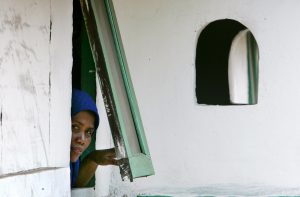There’s nothing like Idul Fitri in Indonesia, the world’s largest Muslim-majority country. Jakarta hums endlessly all year — except for those two days. With the capital home to the vast majority of the country’s COVID-19 cases, how Idul Fitri, which begins Sunday, will look is unprecedented. How happy celebrations can even be with livelihoods devastated and support slow is another question.
The decision to formally ban mudik, the tradition of Indonesian Muslims returning to their hometowns to celebrate Idul Fitri (known also as Lebaran in Indonesia and Eid al-Fitr elsewhere), handed down by the Presidential Palace was widely welcomed. Jakarta typically feels deserted over the holiday, with millions of residents hitting the road. This year, fears that a mass exodus from the country’s COVID-19 epicenter would see cases in other provinces explode have prompted road closures and a temporary halt on domestic air travel.
Still, controlling the movements of tens of millions of people is a monumental task. Even as early as the beginning of April, University of Melbourne researcher Belinda Spagnoletti warned many were making their moves ahead of expected closures. Citing data from Central Java, she wrote that tens of thousands of Jakartans had arrived in the province over an eight-day period in early April.
For many of these travelers it’s unlikely mudik was the only draw. As seen everywhere in the world, the early days of the COVID-19 crunch saw mass layoffs and increased stress on those in informal sectors acting more as push factors than mudik pulled.
As the holiday approaches, mixed messaging from the authorities has led to confusion in Jakarta. Governor Anies Baswedan was forced to issue a statement Saturday clarifying that in addition to Jakartans being banned from leaving the city, traveling within the city to celebrate with friends and family in other households would also be banned.
“The virus knows no holidays, it doesn’t care if it’s Lebaran [Idul Fitri] or not. Let’s not exacerbate the situation in Greater Jakarta […] and render our [mitigation] efforts over the past two months useless,” he said, as reported by the Jakarta Post.
The governor’s statement comes as public frustration over the handling of the crisis reaches a fever pitch. Social media campaigns orchestrated by the country’s public health workers have turned from imploring the community to #StayAtHome and begging for more personal protection equipment (PPE) to the defeated #IndonesiaTerserah. The hashtag, meaning “whatever, Indonesia,” features defeated workers challenge those who are not adhering to social distancing measures.
President Joko “Jokowi” Widodo ordered his cabinet on Monday to mobilize on the slow and clumsy dispersion of social aid, one of the most vital factors in enforcing the state’s measures. Indonesia’s infamously labyrinthine bureaucracy — a frequent target of the President, who has had middling success at reform — has been slow in rolling out emergency funding to those who need it most.
Channel News Asia reports that during the meeting, Jokowi said just 15 percent of villagers and 25 percent of city dwellers whose livelihoods have been impacted by the crisis have received any social aid at all.
“Give more flexibility to regional governments, particularly villages, to make and implement their own policies. Of course, we must maintain accountability,” the president told the cabinet. Cash payments totalling 1.8 million Indonesian rupiah ($121) targeting 23 million households will be dispensed over the next three months via the Ministries of Social Affairs and Villages and Underdeveloped Regions.
If the official stance that Indonesia had no cases of COVID-19 until early March is to be accepted, it still does not account for why, as of mid-May, the president is struggling with the roll-out of emergency programs. If Indonesia was indeed blessed in avoiding the pandemic’s early wave that struck so many of its neighbors, that headstart was wasted. Where Malaysia, Thailand and Singapore moved quickly — their own struggles notwithstanding — Indonesia missed its opportunity to get ahead of the pandemic.
That missed opportunity right now seems at the cost of faith in Jokowi’s government and the economy, but it is hundreds of millions Indonesians who will suffer.

































